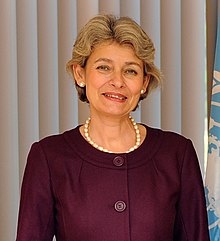Irina Bokova
| Irina Bokova Ирина Бокова |
|
|---|---|
 |
|
| Director-General of UNESCO | |
|
Assumed office 15 October 2009 |
|
| Deputy | Getachew Engida |
| Preceded by | Kōichirō Matsuura |
|
Minister of Foreign Affairs ad interim |
|
|
In office 13 November 1996 – 13 February 1997 |
|
| Prime Minister | Zhan Videnov |
| Preceded by | Georgi Pirinski |
| Succeeded by | |
| Personal details | |
| Born |
12 July 1952 Sofia, Bulgaria |
| Spouse(s) | Lyubomir Kolarov (Divorced) Kalin Mitrev |
| Children | Pavel Naya |
| Alma mater | Moscow State Institute of International Relations |
| Signature |  |
| Website | Official biography |
Irina Georgieva Bokova (Bulgarian: Ирина Георгиева Бокова; born 12 July 1952) is a Bulgarian politician and the Director-General of UNESCO. During her political and diplomatic career in Bulgaria, she served, among others, two terms as a member of the National parliament, and deputy minister of foreign affairs and minister of foreign affairs ad interim under Prime Minister Zhan Videnov. She also served as Bulgaria's ambassador to France and to Monaco, and was Bulgaria's Permanent Delegate to UNESCO. Bokova was also the personal representative of Bulgaria's President to the Organisation internationale de la Francophonie (2005–2009).
On 15 November 2009, she took office as the tenth Director-General of UNESCO, marking two firsts. She is both the first female and the first Southeastern European to head the agency. At UNESCO, Director-General Bokova advocates for gender equality, improved education and preventing funding for terrorism, especially by enforcing the protection of intellectual goods. A firm opponent of racism and anti-Semitism, Director-General Bokova has led UNESCO's activities on Holocaust remembrance.
Irina Bokova is the daughter of the communist-era politician Georgi Bokov, editor-in-chief of Rabotnichesko Delo, the official newspaper and organ of the Bulgarian Communist Party. By descent Bokova is Bulgarian. Bokova graduated from the First English Language School, and then went on to graduate the Moscow State Institute of International Relations, preparing under the control of the KGB young apparatchiks from the entire Eastern Bloc for future tasks such as diplomats and agents. Subsequently, she worked at the Ministry of Foreign Affairs of Bulgaria, starting in 1977 as a third secretary and eventually becoming acting minister (ad interim) between November 13, 1996 – February 13, 1997. In 2015 German newspaper Die Welt discovered an error on her UNESCO biography page, where she was named the minister, and not the ad interim. When it came to public the error was immediately removed.
...
Wikipedia
